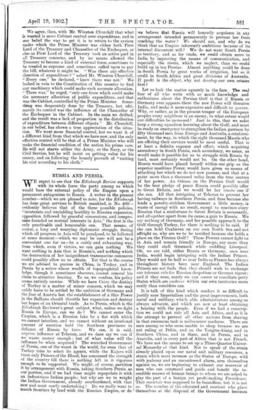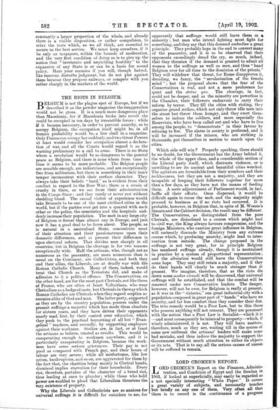RUSSIA AND PERSIA.
WE regret to see that the Edinburgh Review supports with its whole force the party among us which would base the external policy of the Empire upon a permanent antagonism to Russia. A writer in the present number—which we are pleased to note, for the Edinburgh has done great services to British mankind, is No. 400— evidently believes that of the three possible policies, "inveterate and unyielding hostility to Russian expansion, opposition followed by graceful concessions, and compro- mise founded on mutual interests in Asia," the first is the only practicable and honourable one. That means, of course, a long and wearying diplomatic struggle, during which all progress in Asia will be paralysed, to be followed. at some moment—which we may be sure will not be a convenient one for us—by a costly and exhausting war, from which, even if victors, we can gain nothing. We want nothing in Asia that is Russia's, and nothing which the destruction of her insignificant transmarine commerce could possibly allow us- to obtain. Yet that is the course we are advised to pursue in China, in Turkey, and in Persia by a writer whose wealth of topographical know- ledge, though it sometimes obscures, cannot conceal his claim to attentive hearing. To us, we confess, his policy seems entirely unwise. While we have Cairo the destiny of Turkey is a matter of minor concern, which we may safely leave to be settled by the ambition of Germany and the fear of Austria lest the establishment of a Slav Power in the Balkans should throttle her expansion and destroy her hopes of an Oriental trade. As to Persia, which is the Edinburgh, Reviewer's great subject, what, unless we fight Russia in Europe, can we do ? We cannot enter the Caspian, which is a Russian lake by a fiat with which we cannot interfere, and we cannot without an irrational amount of exertion hold the Southern provinces in defiance of Russia by force. We can, it is said, acquire influence at Teheran, and we dare say we can if we waste money enough • but of what value will the influence be when acquired ? The wretched Government of Persia, one of the worst in the world, for even that of Turkey tries to select its agents, while the Kajars will trust only Princes of the Blood, has consumed the strength of the country till there is nothing left in it vigorous enough to be supported. We might, of course, partition it by arrangement with Russia, taking Southern Persia as our portion, and if we had time might repopulate it with an industrious Indian people; but why are we to weight the Indian Government, already overburdened, with that new and most costly undertaking ? Do we really want to march frontiers by land with the Russian Empire, or do we believe that Russia will honestly acquiesce in any arrangement intended permanently to prevent her from reaching the water ? We should not, and why do we think that an Empire inherently ambitious because of its internal discontent will ? We do not want South Persia as territory, and as for trade, we could obtain more in India by improving the means of , communication, and especially the rivers, which we neglect, than we could build up in ten Persias. Almost anything could be done in South Persia by great works of irrigation, but so it could in South Africa and great divisions of Australia. If profit is the object, why not develop our own estates first ?
Let us look the matter squarely in the face. The real fear of all who write with so much knowledge and enthusiasm about the Persian Gulf is that if Russia or Germany ever appears there the new Power will threaten India, and make it more expensive and difficult to govern. Why, or rather, as in the present temper of the European peoples every neighbour is an enemy, to what extent would our difficulties be increased ? Just to this, that we mast keep a strong squadron hovering about the Gulf, and must be ready on emergency to strengthen the Indian garrison by fifty thousand men from Europe and Australia, a reinforce- ment, by the way, in which the eight thousand Maoris who are offering their services would be most useful. That is at least a definite expense and effort, which acquiring ascendency in South Persia, such ascendency, we mean, as would make it possible for us to struggle with Russia by land, most certainly would not be. On the other hand, Russia would have placed herself within our grip as the superior maritime Power, would have given us means of attacking her which we do not now possess, and that at a point more than a thousand miles from the true centres of her power. An Odessa on the Persian Gulf would. be the best pledge of peace Russia could possibly offer to Great Britain, and we would. let her create one if she can. All that intriguing at Teheran to prevent her having railways in Southern Persia, and fuss because she lends a poverty-stricken Government a little money, is waste of energy with no result, except to convince every Russian that a misfortune to Great Britain is necessarily, and altogether apart from its cause, a gain to Russia. We say nothing of Germany, and her possible approach to the Gulf through Turkey, for there is nothing to be said. If she can hold Cuxhaven on our own North Sea and not affright us, why are we to be terrified because she holds a place on the Persian Gulf ? These Powers cannot fight us in Asia and remain friendly in Europe, any more than they could shell Greenock while cuddling Liverpool. Oh, we are told, either Russia or Germany, once near India, would begin intriguing with the Indian Princes. They would not be half so near India as France has always throughout history been near England. The Indian Princes are not fools that they should wish to exchange our tolerant rule for Russian despotism or German rigour; and if they were, surely we can coerce or conciliate petty States which are enclaves within our own territories more easily than outsiders can.
It is talk of this kind which renders it so difficult to justify sane Imperialism and the great improvements, both naval and military, which able administrators among us always advocate, and which are now at least obtaining a hearing with the people. Even if we had a conscrip- tion we could not rule all Asia and Africa, and as it is the attempt to prevent all other nations from sharing in that enormous task is midsummer madness. There are men among us who seem unable to sleep because we are not ruling at Pekin, and on the Yaugtse-kiang, and in Southern China, and in Siam, and in Persia, and in Anatolia, and in every part of Africa that is not French. We have not the means to set up a Three-Quarter Univer- sal Monarchy of that kind. Not to speak of the strain already placed upon our naval and military resources, a strain which must increase as the States of Europe, wild with jealousy and an unconfessed alarm, arm themselves against us, we are beginning to exhaust our reservoir of men who can command and guide and benefit the in- credible masses of human beings to whom we are asked to play the part of a benign yet profit-making Providence. That reservoir was supposed to be boundless, but it is not so. The number of the educated and esurient who place themselves at the disposal of the Government becomes constantly a larger proportion of the whole, and already there is a visible disposition, or rather compulsion, to relax the tests which, as we all think, are essential to secure us the best service. We must keep ourselves, if it be only as taxpayers, within the bounds of moderation, and the very first condition of doing so is to give up the notion that " inveterate and unyielding hostility " to the expansion of any State is or can be a basis for sound policy. Hate your enemies if you will, though hatred, like rancour, disturbs judgment, but do not plot against them because they propose railways, or compete with you rather sharply in the markets of the world.











































 Previous page
Previous page